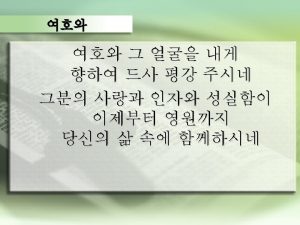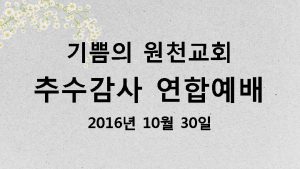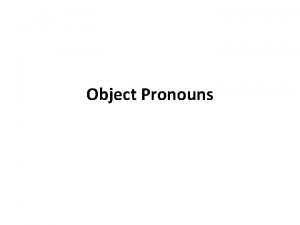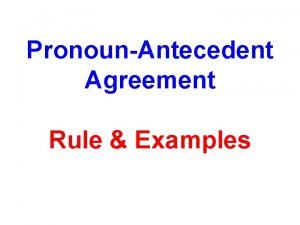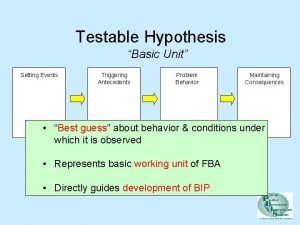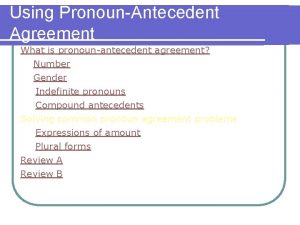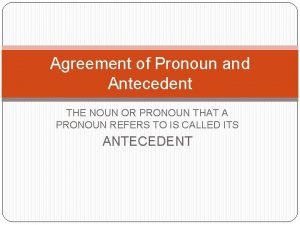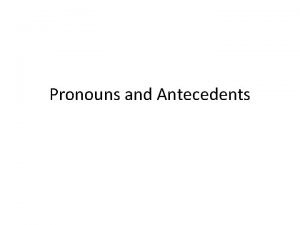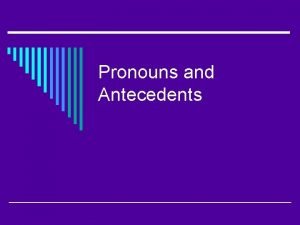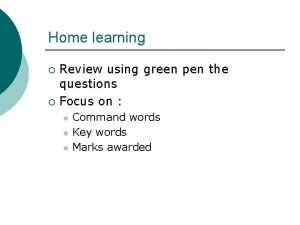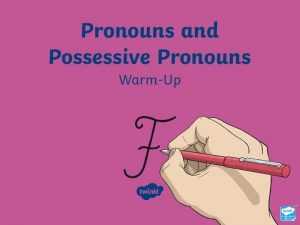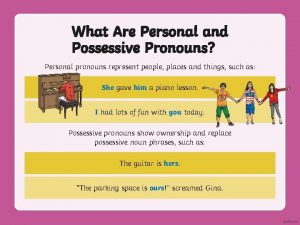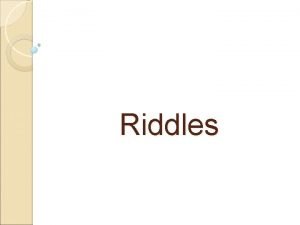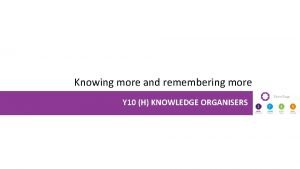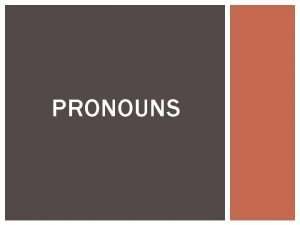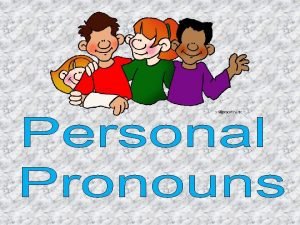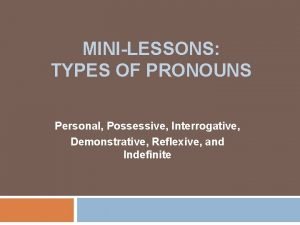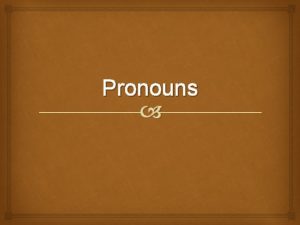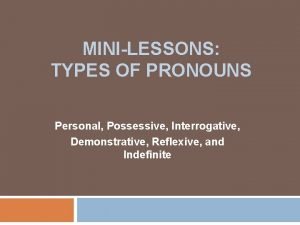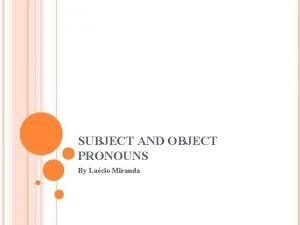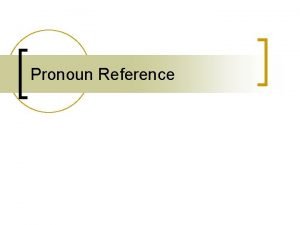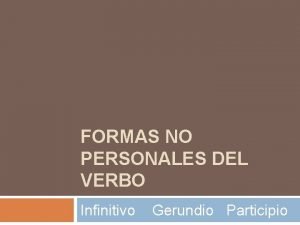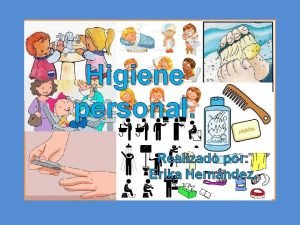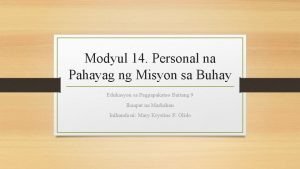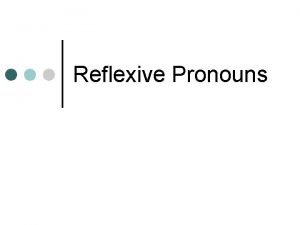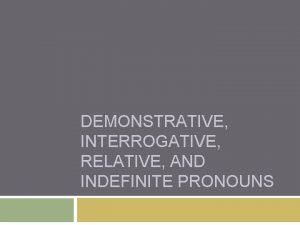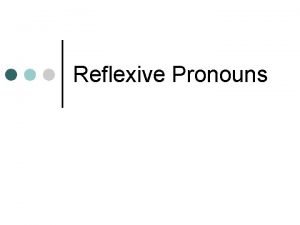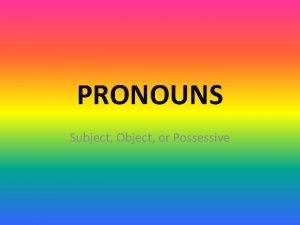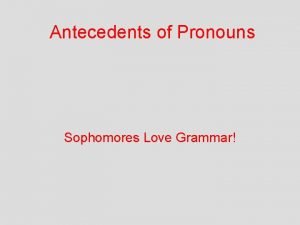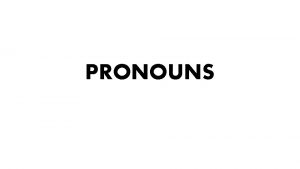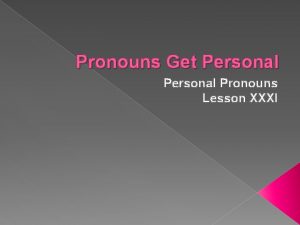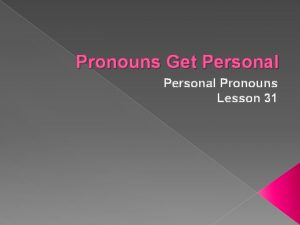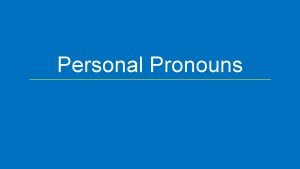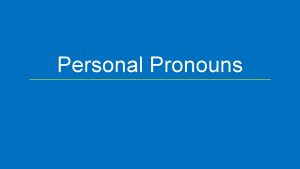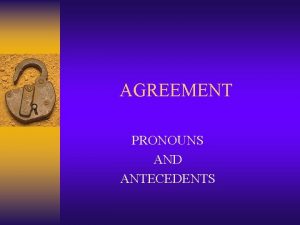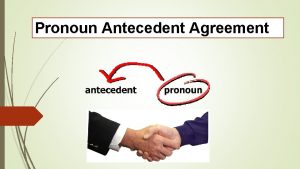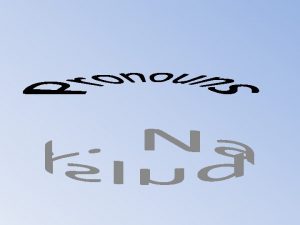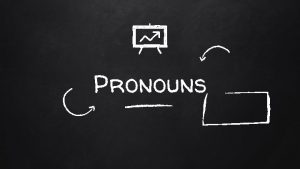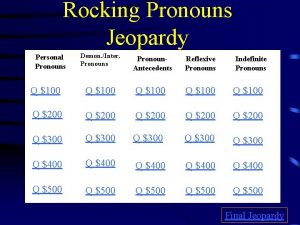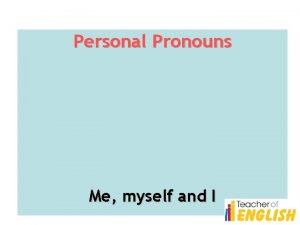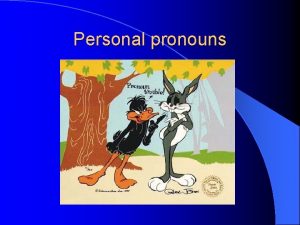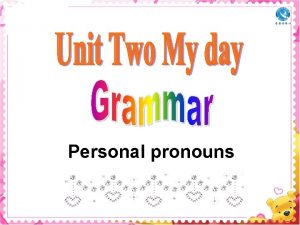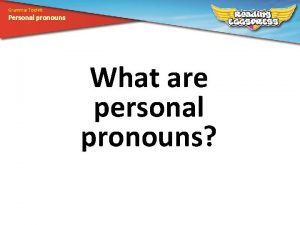Pronouns and More Pronouns Pronouns and Antecedents Personal














































- Slides: 46

Pronouns and More Pronouns • Pronouns and Antecedents • Personal • Reflexive and Intensive • Demonstrative • Interrogative • Relative and Indefinite

Pronouns and Antecedents A pronoun is a word that is used in place of one or more nouns or pronouns. An antecedent is the word that a pronoun stands for or refers to. WEIRD Ask Dan if Dan has done Dan’s homework. BETTER Ask Dan if he has done his homework.

Pronouns and Antecedents More Examples: Will Kendra walk Kendra’s dog this afternoon? Will Kendra walk her dog this afternoon? The twins congratulated the twins because the twins’ basketball team won the championship. The twins congratulated themselves because their basketball team won the championship.

Personal Pronouns A personal pronoun refers to the one speaking (first person), the one spoken to (second person), or the one spoken about (third person). Personal Pronouns Singular Plural First Person I, me, my, mine we, us, ours Second Person you, your, yours Third Person he, him, his, she, hers, it its they, them, theirs

Identify the Personal Pronouns in the following sentences. 1) I liked him until he opened his mouth. 2) She told him the secret about your friend. 3) You wish they had more style. 4) Those tickets belong to us. 5) We hope to see them at her party.

Identify the Personal Pronouns in the following sentences. 1) I liked him until he opened his mouth. 2) She told him the secret about your friend. 3) You wish they had more style. 4) Those tickets belong to us. 5) We hope to see them at her party.

Identify the Personal Pronouns in the following sentences. 1) I liked him until he opened his mouth. 2) She told him the secret about your friend. 3) You wish they had more style. 4) Those tickets belong to us. 5) We hope to see them at her party.

Identify the Personal Pronouns in the following sentences. 1) I liked him until he opened his mouth. 2) She told him the secret about your friend. 3) You wish they had more style. 4) Those tickets belong to us. 5) We hope to see them at her party.

Identify the Personal Pronouns in the following sentences. 1) I liked him until he opened his mouth. 2) She told him the secret about your friend. 3) You wish they had more style. 4) Those tickets belong to us. 5) We hope to see them at her party.

Identify the Personal Pronouns in the following sentences. 1) I liked him until he opened his mouth. 2) She told him the secret about your friend. 3) You wish they had more style. 4) Those tickets belong to us. 5) We hope to see them at her party.

Reflexive and Intensive Pronouns A reflexive pronoun refers to the subject and is necessary to the meaning of the sentence. An intensive pronoun emphasizes a noun or another pronoun and is unnecessary to the meaning of the sentence. Reflexive and Intensive Pronouns First Person myself, ourselves Second Person yourself, yourselves Third Person himself, herself, itself, themselves REFLEXIVE: Tara enjoyed herself at the party. The team prided themselves on their victory. INTENSIVE I myself cooked that delicious dinner. Did you redecorate the room yourself?

Reflexive or Intensive? �Morgan treated herself to a fruit smoothie.

Reflexive or Intensive? �Morgan treated herself to a fruit smoothie.

Reflexive or Intensive? �Morgan treated herself to a fruit smoothie. REFLEXIVE

Reflexive or Intensive? �The awards were sent directly to the winners themselves.

Reflexive or Intensive? �The awards were sent directly to the winners themselves.

Reflexive or Intensive? �The awards were sent directly to the winners themselves. INTENSIVE

Demonstrative Pronouns A demonstrative pronoun points out a person, a place, a thing, or an idea. Demonstrative Pronouns This that these those Examples This is the book I bought for my sister. Are those the kinds of plants that bloom at night? NOTE: This, that, these, and those can also be used as adjectives. When they are used in this way, they are called demonstrative adjectives. DEMONSTRATIVE PRONOUN DEMONSTRATIVE ADJECTIVE Those are very sturdy shoes. Those shoes are very sturdy. DEMONSTRATIVE PRONOUN DEMONSTRATIVE ADJECTIVE Did you order this? Did you order this salad?

Identify the Demonstrative Pronouns This is a fantastic book about giraffes.

Identify the Demonstrative Pronouns This is a fantastic book about giraffes.

Identify the Demonstrative Pronouns This is a fantastic book about giraffes. What is this referring to?

Identify the Demonstrative Pronouns This is a fantastic book about giraffes. What is this referring to? book

Identify the Demonstrative Pronouns Are these your cousins from Nebraska?

Identify the Demonstrative Pronouns Are these your cousins from Nebraska?

Identify the Demonstrative Pronouns Are these your cousins from Nebraska? What is these referring to?

Identify the Demonstrative Pronouns Are these your cousins from Nebraska? What is these referring to? COUSINS

Interrogative Pronouns An interrogative pronoun introduces a question. Interrogative Pronouns What whose Examples which whom What is the best brand of frozen yogurt? Who wrote Barrio Boy?

Identify the Interrogative Pronouns Who will bring the party favors?

Identify the Interrogative Pronouns Who will bring the party favors?

Identify the Interrogative Pronouns What is your favorite color?

Identify the Interrogative Pronouns What is your favorite color?

Relative Pronouns A relative pronoun introduces an adjective clause (subordinate clause). The clause adds information about the noun that comes before it. Common Relative Pronouns that which whom whose Examples: Thomas Jefferson, who wrote the Declaration of Independence, was our country’s third president. Exercise is something that many people enjoy.

Identify the Relative Pronouns This is the shirt that I bought yesterday.

Identify the Relative Pronouns This is the shirt that I bought yesterday.

Identify the Relative Pronouns This is the shirt that I bought yesterday. The relative pronoun that introduces the subordinate clause that I bought yesterday. The subordinate clause adds information about shirt.

Identify the Relative Pronouns This is the shirt that I bought yesterday. The relative pronoun that introduces the subordinate clause that I bought yesterday. The subordinate clause adds information about shirt.

Indefinite Pronouns Indefinite pronouns refer to a person or thing whose exact identity is unknown. • Some indefinite pronouns are singular. • Some are plural. • Some may be either singular or plural, depending on how they are used.

Indefinite Pronouns Indefinite pronouns The following indefinite pronouns are singular: Singular indefinite pronouns anybody either neither one anyone everybody nobody somebody anything everyone no one someone each everything nothing Something Each Someone One of the oncars ladies the isboys’ left missing her team notebook one forgot of its his here. hubcaps. backpack.

Indefinite Pronouns Indefinite pronouns The following indefinite pronouns are plural: Plural indefinite pronouns both few many Both of the soldiers respect their captain. Few of the dogs obeyed their owners. If several are ready, serve them. several

Identify the Indefinite Pronouns Does anyone know the answer?

Identify the Indefinite Pronouns Does anyone know the answer?

Identify the Indefinite Pronouns Does anyone know the answer? The indefinite pronouns anyone does not refer to a specific person.

Identify the Indefinite Pronouns We have everything we need for the picnic.

Identify the Indefinite Pronouns We have everything we need for the picnic.

Identify the Indefinite Pronouns We have everything we need for the picnic. The indefinite pronoun everything does not refer to a specific thing.

Complete “Pronouns and More Pronouns” Worksheet and Quiz In your Google Classroom Use this Lesson as your complete them. Due by Friday
 Lirik lagu more more more we praise you
Lirik lagu more more more we praise you More more more i want more more more more we praise you
More more more i want more more more more we praise you Italicized pronoun examples
Italicized pronoun examples Plural form of object
Plural form of object Pronoun-antecedent agreement examples
Pronoun-antecedent agreement examples Setting events and antecedents
Setting events and antecedents Plural antecedent
Plural antecedent Compound antecedents
Compound antecedents Compound antecedents
Compound antecedents Carron’s antecedents
Carron’s antecedents Antecedents of modern quality management
Antecedents of modern quality management Whats antecedents
Whats antecedents Recognizing antecedents
Recognizing antecedents Carron’s antecedents
Carron’s antecedents Antecedents of functionalism
Antecedents of functionalism Personal pronouns and possessive pronouns
Personal pronouns and possessive pronouns Match the possessive below
Match the possessive below Human history becomes more and more a race
Human history becomes more and more a race 5 apples in a basket riddle
5 apples in a basket riddle The more you study the more you learn
The more you study the more you learn Aspire not to
Aspire not to Example of newtons first law
Example of newtons first law Knowing more remembering more
Knowing more remembering more More love to thee o lord
More love to thee o lord More choices more chances
More choices more chances More personal computing
More personal computing Subject pronouns
Subject pronouns The bike belongs to her. it is ______ bike
The bike belongs to her. it is ______ bike Plural for he
Plural for he Personal possessive and indefinite pronouns
Personal possessive and indefinite pronouns Possessive reflexive pronouns
Possessive reflexive pronouns Types of pronouns
Types of pronouns Object pronouns exemplos
Object pronouns exemplos What is a subject pronoun
What is a subject pronoun Ejercicios de verbos en infinitivo
Ejercicios de verbos en infinitivo Adivinanzas de aseo personal
Adivinanzas de aseo personal Mga dapat isaalang-alang sa pansariling pagtataya
Mga dapat isaalang-alang sa pansariling pagtataya Relative pronoun as possessive
Relative pronoun as possessive Reflexive pronouns definition
Reflexive pronouns definition Relative and demonstrative pronouns
Relative and demonstrative pronouns Demonstrative and interrogative adjectives
Demonstrative and interrogative adjectives Reflexive and reciprocal pronouns
Reflexive and reciprocal pronouns Object pronouns and reflexive pronouns
Object pronouns and reflexive pronouns Personal pronouns 6o ano
Personal pronouns 6o ano Alliteration in persuasive writing
Alliteration in persuasive writing Reciprocal pronoun
Reciprocal pronoun Objective case
Objective case
